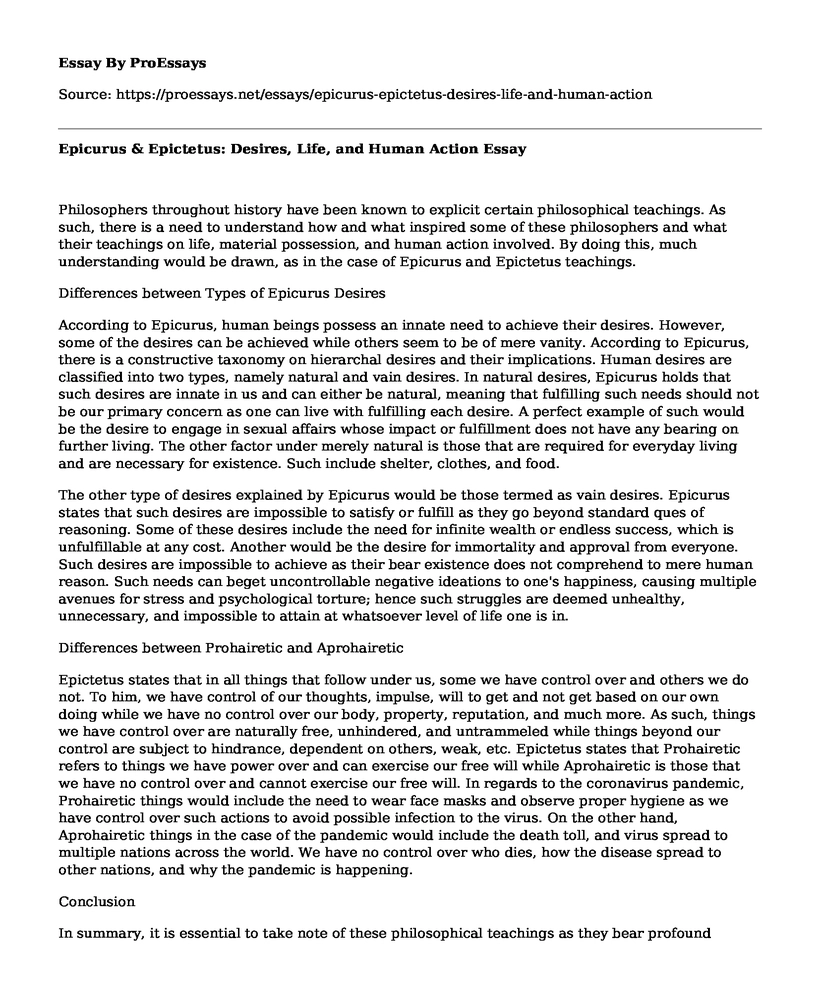Philosophers throughout history have been known to explicit certain philosophical teachings. As such, there is a need to understand how and what inspired some of these philosophers and what their teachings on life, material possession, and human action involved. By doing this, much understanding would be drawn, as in the case of Epicurus and Epictetus teachings.
Differences between Types of Epicurus Desires
According to Epicurus, human beings possess an innate need to achieve their desires. However, some of the desires can be achieved while others seem to be of mere vanity. According to Epicurus, there is a constructive taxonomy on hierarchal desires and their implications. Human desires are classified into two types, namely natural and vain desires. In natural desires, Epicurus holds that such desires are innate in us and can either be natural, meaning that fulfilling such needs should not be our primary concern as one can live with fulfilling each desire. A perfect example of such would be the desire to engage in sexual affairs whose impact or fulfillment does not have any bearing on further living. The other factor under merely natural is those that are required for everyday living and are necessary for existence. Such include shelter, clothes, and food.
The other type of desires explained by Epicurus would be those termed as vain desires. Epicurus states that such desires are impossible to satisfy or fulfill as they go beyond standard ques of reasoning. Some of these desires include the need for infinite wealth or endless success, which is unfulfillable at any cost. Another would be the desire for immortality and approval from everyone. Such desires are impossible to achieve as their bear existence does not comprehend to mere human reason. Such needs can beget uncontrollable negative ideations to one's happiness, causing multiple avenues for stress and psychological torture; hence such struggles are deemed unhealthy, unnecessary, and impossible to attain at whatsoever level of life one is in.
Differences between Prohairetic and Aprohairetic
Epictetus states that in all things that follow under us, some we have control over and others we do not. To him, we have control of our thoughts, impulse, will to get and not get based on our own doing while we have no control over our body, property, reputation, and much more. As such, things we have control over are naturally free, unhindered, and untrammeled while things beyond our control are subject to hindrance, dependent on others, weak, etc. Epictetus states that Prohairetic refers to things we have power over and can exercise our free will while Aprohairetic is those that we have no control over and cannot exercise our free will. In regards to the coronavirus pandemic, Prohairetic things would include the need to wear face masks and observe proper hygiene as we have control over such actions to avoid possible infection to the virus. On the other hand, Aprohairetic things in the case of the pandemic would include the death toll, and virus spread to multiple nations across the world. We have no control over who dies, how the disease spread to other nations, and why the pandemic is happening.
Conclusion
In summary, it is essential to take note of these philosophical teachings as they bear profound insights into life. Furthermore, there is a need to apply human reasoning at all times on desires we can readily achieve and leaving what we cannot. Such actions would free us of the need to achieve vain desires that only promote more misery and psychological stress.
Cite this page
Epicurus & Epictetus: Desires, Life, and Human Action. (2023, Jun 08). Retrieved from https://proessays.net/essays/epicurus-epictetus-desires-life-and-human-action
If you are the original author of this essay and no longer wish to have it published on the ProEssays website, please click below to request its removal:
- Business Plan Analysis Essay
- Comparing Baghdad to the Last Great Native Civilization in Central Mexico (The Aztec)
- Essay Example on Emotional Labor in the Workplace: Effects and Attitudes
- Online Therapy: A Growing Form of Telehealth - Essay Sample
- Essay on Understanding Prochaska & DiClemente's Model of Intentional Behavior Change
- Essay on Tech-Savvy Millennials and Tourism: Understanding S. Korea's Dynamics
- Walter Reed Psychological Center: Multidisciplinary Behavioral Health Care in San Diego - Report Example







